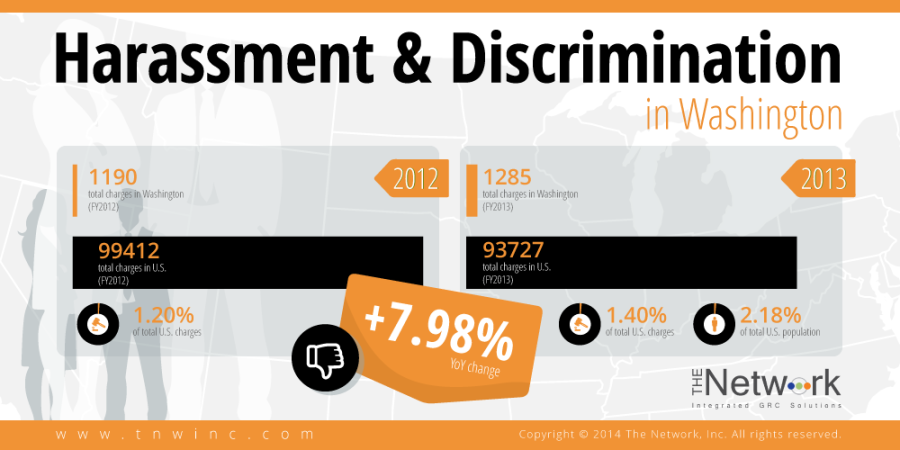State misconduct charges increase
April 9, 2014
When she took a job at a local hospital in Spokane, EWU student Casey Polmueller knew she would have to deal with a lot of out-of-the-ordinary experiences. She did not think sexual harassment would be one of them.
In the past year, Polmueller said the comments about “women’s work,” inappropriate sexual remarks and inappropriate touching began to pile up.
She is not alone. The Equal Employment Opportunity Commission, or EEOC, recently released its 2013 report of harassment and discrimination in the workplace and found that Washington had 1,285 harassment and discrimination charges in 2013, which is up nearly 8 percent from 2012.
“Sexual harassment and discrimination work to devalue and dehumanize,” Polmueller said. “They are acts that can be prevented by discussion, and an empathetic understanding of people that are different from yourself.”
Instead of reporting the behavior, Polmueller said she addressed the issue firmly, yet politely, to the people making harassing comments.
“I think creating an open dialogue with co-workers and not remaining quiet is the only way that people acknowledge and change inappropriate behaviors,” Polmueller said. “A lot of people are not trying to be offensive, but rather funny. When they learn they’re being offensive they typically apologize and stop the behavior.”
Gayla Thomas, director of Equal Opportunity, Affirmative Action, Title IX, and Americans with Disabilities Act compliance at EWU, said whatever your intentions are, not reporting these incidents is a mistake. She encourages EWU students to report these types of incidents whether they occur on campus, off campus or at a place of employment.
“The power is in reporting,” said Thomas. “If the perpetrator is going to sexually harass you, you can’t take it for granted. It may rise to an assault, and possibly violence. If they don’t report, we can’t do anything. We can’t fix the problem.”
Thomas said she has not seen the EEOC reports, but the number of incidents at Eastern is also rising. From 2012, to 2013, Thomas estimates reports have increased by about 5 percent.
The incidents investigated by the Office of Opportunity and Diversity have all of the possible configurations of staff to student, student to student, and staff to staff harassment. Thomas said complaints may be as mild as “I don’t think my supervisor likes me.”
“And when they don’t think their supervisor likes them, I ask them ‘Why?’” Thomas said. “It’s all about the facts. Investigators should stay neutral.”
Thomas said most of the complaints she gets are actually from staff members rather than students. She said the hardest incidents for students to report are staff to student harassment incidents, in which the students fear that reporting a professor may have a negative effect on their grades.
“I get them from students most of the time between quarters, when grades are due to come out,” Thomas said. “Right before the end of the school year, I get slammed with complaints. Students will go through two or three quarters. They will wait.”
Even when a complaint is past the statute of limitations of 180 days, Thomas said she will still share the information with the dean or the department chair of the person being accused of harassment. “I want them to know that this complaint came into the office. This may be something that occurred. They may need to take a look at it.”
“The increase [at EWU] doesn’t mean they are all cases that have required investigation,” Thomas said. “When discrimination and harassment take place between two individuals, often times it’s mediated.I have a meeting with the complainant and the respondent, and we come to a resolution agreement.”
Due to her role as an investigator, Thomas said she cannot directly advocate for students, but she is always glad to provide education and resources for incidents which occur both on and off campus.
In Polmueller’s case, one of the people harassing her was in a management position, which left her feeling she had little options for reporting the incident.
“[Polmueller] needs to find the human resource office at that hospital, and report that incident to them,” Thomas said. “If she does not feel comfortable reporting it at the hospital, she can go to the Human Rights Commission in Spokane.”
“My job is to make sure university policies are not being violated,” Thomas said. “But that does include off-campus activities. We’re going to ensure that students have victim’s advocate assistance and know all of their resources.”
Thomas said she encourages all the groups, clubs and organizations on campus to reach out to her office. She said she offers training and education on sexual harassment and discrimination, and works closely with the EWU office of Human Resources on issues of bullying.
Polmueller said she has not reported anyone at her job, but would if the harassment ever became persistent. She said her manager was let go due to harassment issues not related to her.
“Knowledge is power,” Thomas said. “The more people on this campus that we can educate about what the law says, it may help save somebody’s life.”







![Simmons said the biggest reasons for her success this year were “God, hard work, and trusting [her] coach and what she has planned.”](https://theeasterner.org/wp-content/uploads/2024/05/image1-1-1200x800.jpg)


![Simmons said the biggest reasons for her success this year were “God, hard work, and trusting [her] coach and what she has planned.”](https://theeasterner.org/wp-content/uploads/2024/05/image1-1-600x400.jpg)






